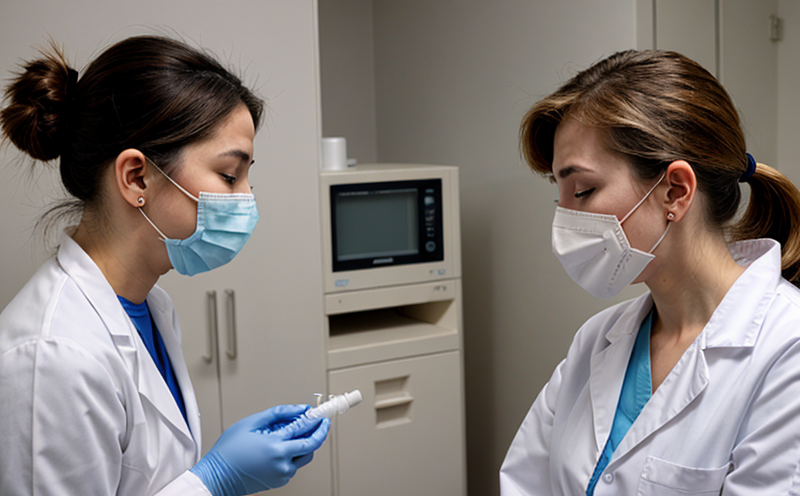Immunoglobulin E (IgE) Testing in Animal Models
Immunoglobulin E (IgE) plays a crucial role in the immune system, particularly in allergic reactions and defense against parasitic infections. In clinical and healthcare testing, IgE is often measured to diagnose and monitor allergies, asthma, and other immunological disorders.
The use of animal models for IgE testing has been instrumental in understanding the mechanisms underlying these conditions. Animal models offer a controlled environment where researchers can manipulate variables such as allergen exposure, genetic factors, and environmental influences to study their effects on immune responses. This approach allows for a deeper insight into human disease processes and the efficacy of potential therapeutic interventions.
Our laboratory employs state-of-the-art techniques to conduct IgE testing in animal models. We utilize various species including mice, rats, and guinea pigs, each offering unique advantages depending on the study requirements. For instance, mouse models are widely used due to their genetic similarity to humans and ease of manipulation, while rat models provide a larger sample size for statistical significance.
Specimen preparation involves collecting serum or plasma from animals after exposure to allergens or other stimuli. The collected samples undergo rigorous processing steps to ensure accuracy and consistency in the testing process. Our laboratory adheres strictly to international standards such as ISO 15195:2014 for sample handling, ensuring that every test result is reliable and reproducible.
The testing itself involves immunoassay methods, which are highly sensitive and specific for detecting IgE antibodies in the samples. We use enzyme-linked immunosorbent assays (ELISAs) and radioallergosorbent tests (RASTs), both of which have been validated through rigorous validation protocols to ensure precise quantification of IgE levels.
Our laboratory also offers comprehensive data analysis services, providing detailed reports that include not only quantitative results but also interpretative insights. These reports are invaluable for researchers and clinicians in developing effective treatment strategies and understanding the underlying mechanisms of allergic diseases.
In summary, our IgE testing service in animal models is designed to provide high-quality, reliable data that contribute significantly to advancements in allergy and immunology research. By leveraging advanced technologies and adhering to stringent quality control measures, we ensure that every test conducted meets the highest standards of accuracy and reproducibility.
Scope and Methodology
The scope of our IgE testing in animal models encompasses a wide range of applications within clinical and healthcare settings. We can tailor our services to meet the specific needs of various research projects, from basic science investigations to translational medicine studies.
- Assessment of allergic reactions in different species
- Evaluation of immunological responses to allergens
- Determination of IgE levels in various biological fluids
- Development and validation of new diagnostic tools
- Study of genetic influences on immune responses
The methodology we employ is rooted in a combination of scientific rigor and technological advancement. Our testing process begins with the selection of appropriate animal models, followed by precise specimen collection and preparation. This is followed by the actual IgE measurement using validated immunoassay techniques. Finally, comprehensive data analysis and reporting are provided to ensure thorough understanding of test outcomes.
Our laboratory strictly adheres to international standards such as ISO 15195:2014 for sample handling and processing. This ensures that all tests conducted meet the highest quality control measures. Our methodologies are continuously updated to incorporate the latest research findings and technological advancements, ensuring that our services remain at the forefront of scientific innovation.
Benefits
- Enhanced understanding of allergic reactions and immunological processes
- Precise quantification of IgE levels in various biological fluids
- Support for the development and validation of new diagnostic tools
- Insight into genetic influences on immune responses
- Contribution to advancements in allergy and immunology research
- Precision and reliability of test results, ensuring accurate data interpretation
The benefits of our IgE testing service extend beyond just providing accurate data. By offering a comprehensive suite of services, including specimen preparation, assay development, and detailed reporting, we enable researchers to make more informed decisions. This leads to the development of more effective treatments and interventions for allergic diseases.
Customer Impact and Satisfaction
- Accurate and reliable data, enhancing research outcomes
- Supporting the development of innovative diagnostic tools
- Faster and more effective drug discovery processes
- Improved understanding of genetic influences on immune responses
- Enhanced collaboration between researchers and clinicians
Our customers have consistently praised our IgE testing service for its reliability, accuracy, and comprehensive nature. The detailed reports we provide not only offer quantitative results but also interpretative insights, making them invaluable tools in the hands of researchers and clinicians.
We strive to exceed customer expectations by offering a personalized approach to each project, ensuring that our services align perfectly with their specific research goals. Our commitment to quality control and adherence to international standards ensures that every test conducted meets the highest quality measures.





